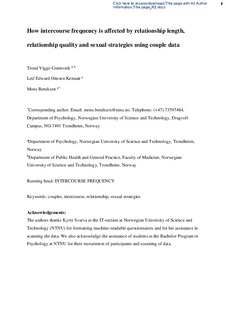| dc.contributor.author | Grøntvedt, Trond Viggo | |
| dc.contributor.author | Kennair, Leif Edward Ottesen | |
| dc.contributor.author | Bendixen, Mons | |
| dc.date.accessioned | 2019-10-14T12:20:35Z | |
| dc.date.available | 2019-10-14T12:20:35Z | |
| dc.date.created | 2019-05-23T15:10:25Z | |
| dc.date.issued | 2019 | |
| dc.identifier.issn | 2330-2925 | |
| dc.identifier.uri | http://hdl.handle.net/11250/2621996 | |
| dc.description.abstract | The frequency of sexual intercourse within couples is associated with a variety of factors, such as relationship length, sexual and relationship satisfaction, and perceived quality of the relationship. Love, as a commitment device, might reduce interest in extrapair sex. Therefore, one can expect a negative association between measures of passion and sociosexual desire. Further, we wish to explore the effects of decoupling love and sex as measured by sociosexual attitudes on sexual frequency; as there might be a greater willingness to compromise on frequency of sex if sex is less related to expression of emotions and relational quality. We examined how men and women’s sociosexuality, relationship length and various dimensions of relationship quality impact couples’ intercourse frequency. Structural Equation Modeling analyses were performed on data from 92 romantically involved, heterosexual couples recruited at a Norwegian university. Participants’ age ranged from 19 to 30 years. The current relationship length ranged from 1 month to 9 years (M = 21 months). Intercourse frequency decreased with increased length of relationship. Both men and women’s ratings of relationship passion were strongly associated with frequency of having sex, but negatively associated with desire for extrapair sex. Intercourse was more frequent in couples where women reported less restricted attitudes, while men’s level of sociosexuality had no effect on intercourse frequency in any of the models. These novel findings suggest that while men in general might desire sex more, in this sample from a highly egalitarian nation, men might be compromising more than women do. | nb_NO |
| dc.language.iso | eng | nb_NO |
| dc.publisher | American Psychological Association | nb_NO |
| dc.title | How Intercourse Frequency Is Affected by Relationship Length,Relationship Quality, and Sexual Strategies Using Couple Data | nb_NO |
| dc.type | Journal article | nb_NO |
| dc.type | Peer reviewed | nb_NO |
| dc.description.version | acceptedVersion | nb_NO |
| dc.source.journal | Evolutionary Behavioral Sciences | nb_NO |
| dc.identifier.doi | 10.1037/ebs0000173 | |
| dc.identifier.cristin | 1699837 | |
| dc.description.localcode | © American Psychological Association, [2019]. This paper is not the copy of record and may not exactly replicate the authoritative document published in the APA journal. Please do not copy or cite without author's permission. The final article is available, upon publication, at: http://dx.doi.org/10.1037/ebs0000173 | nb_NO |
| cristin.unitcode | 194,67,40,0 | |
| cristin.unitcode | 194,65,20,0 | |
| cristin.unitname | Institutt for psykologi | |
| cristin.unitname | Institutt for samfunnsmedisin og sykepleie | |
| cristin.ispublished | true | |
| cristin.fulltext | original | |
| cristin.qualitycode | 1 | |
